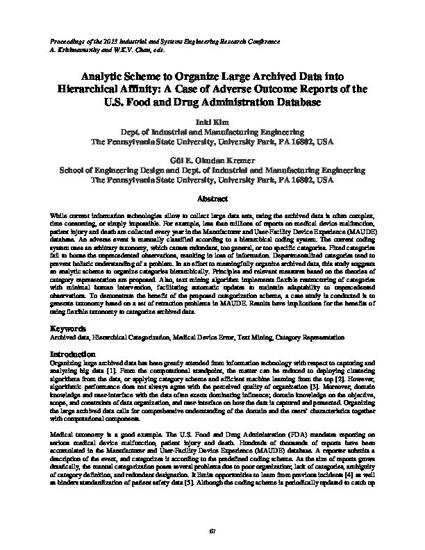
Presentation
Analytic Scheme to Organize Large Archived Data into Hierarchical Affinity: A Case of Adverse Outcome Reports of the U.S. Food and Drug Administration Database
IIE Annual Conference
(2013)
Abstract
While current information technologies allow to collect large data sets, using the archived data is often complex, time consuming, or simply impossible. For example, less than millions of reports on medical device malfunction, patient injury and death are collected every year in the Manufacturer and User-Facility Device Experience (MAUDE) database. An adverse event is manually classified according to a hierarchical coding system. The current coding system uses an arbitrary taxonomy, which causes redundant, too general, or too specific categories. Fixed categories fail to house the unprecedented observations, resulting in loss of information. Departmentalized categories tend to prevent holistic understanding of a problem. In an effort to meaningfully organize archived data, this study suggests an analytic scheme to organize categories hierarchically. Principles and relevant measures based on the theories of category representation are proposed. Also, text mining algorithm implements flexible restructuring of categories with minimal human intervention, facilitating automatic updates to maintain adaptability to unprecedented observations. To demonstrate the benefit of the proposed categorization scheme, a case study is conducted is to generate taxonomy based on a set of retraction problems in MAUDE. Results have implications for the benefits of using flexible taxonomy to categorize archived data.
Keywords
- Archived data,
- Hierarchical Categorization,
- Medical Device Error,
- Text Mining,
- Category Representation
Disciplines
Publication Date
2013
Comments
This is a proceeding published as Kim, Inki, and Gül E. Okudan Kremer. "Analytic Scheme to Organize Large Archived Data into Hierarchical Affinity: A Case of Adverse Outcome Reports of the US Food and Drug Administration Database." In IIE Annual Conference. Proceedings, p. 67. Institute of Industrial and Systems Engineers (IISE), 2013. Posted with permission.
Citation Information
Inki Kim and Gül E. Kremer. "Analytic Scheme to Organize Large Archived Data into Hierarchical Affinity: A Case of Adverse Outcome Reports of the U.S. Food and Drug Administration Database" IIE Annual Conference (2013) Available at: http://works.bepress.com/gul-kremer/136/
